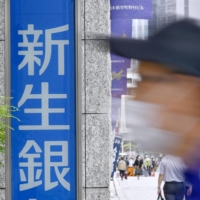Japanese online financial group SBI Holdings Inc. said Wednesday it will extend its unsolicited tender offer for Shinsei Bank until Dec. 8, as requested by the bank, to avoid “unnecessary confusion” among shareholders.
In a potential pause in the escalating tensions between the two, SBI acquiesced to Shinsei, which had dangled the threat of carrying out some of its defense measures against SBI’s hostile takeover bid.
SBI is seeking to raise its stake in Shinsei from the current 20% to 48% in the tender offer, launched in early September.
If the offer is successful, the financial group wants to replace some or all of Shinsei’s management and chart a course toward repaying huge amounts of public funds injected into the bank about two decades ago.
In response to Shinsei’s request for an extension of the tender offer to Dec. 8 from Oct. 25, SBI had laid out four conditions to be met before pushing the offer back to Nov. 24, such as the bank holding an extraordinary shareholders’ meeting by Nov. 17. But Shinsei rejected the proposal and maintained its request.
Shinsei has threatened to launch a defense measure to dilute SBI’s holdings by issuing share warrants, or the right to receive shares, to existing shareholders.
“Our refusal to extend the tender offer period raises the possibility that part of the defensive steps could be tentatively launched (by Shinsei), so we have no choice but to accept the request to avoid causing unnecessary confusion among stakeholders,” SBI said in a statement.
SBI said it will continue to seek Shinsei’s response to its questions, including how the management plans to repay the public funds. Following the 1998 collapse of Shinsei’s predecessor, it received around ¥370 billion ($3.3 billion) in taxpayers’ money. The government still owns around 20% of Shinsei.
SBI has an ambitious goal to become a fourth megabank in Japan after MUFG Bank, Sumitomo Mitsui Banking Corp. and Mizuho Bank. Its CEO Yoshitaka Kitao sees the need for regional banks to reorganize.
In a time of both misinformation and too much information, quality journalism is more crucial than ever.
By subscribing, you can help us get the story right.
SUBSCRIBE NOW


